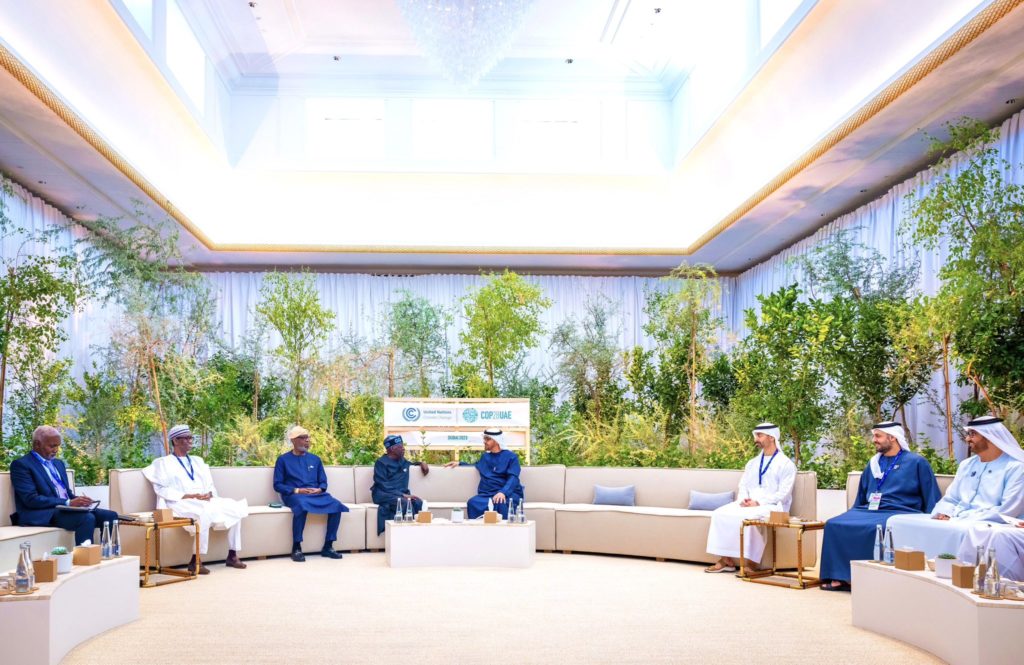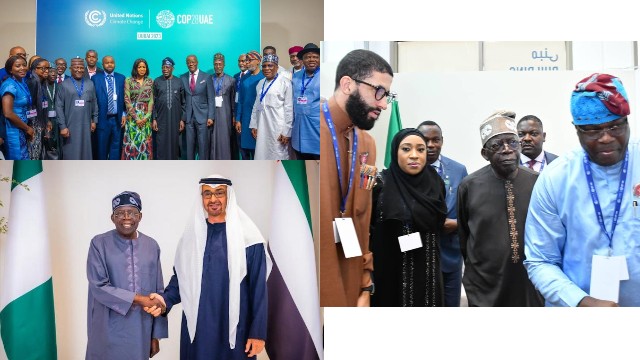President Tinubu’s Vision boldly laid out in his recent CNN op-ed, and is crucial to highlight some of the key issues encapsulated in the op-ed. President Bola Ahmed Tinubu, leading Nigeria and chairing ECOWAS, outlined a comprehensive vision for addressing climate change and promoting sustainable development in the region. With a population exceeding 200 million, President Tinubu’s vision is to emphasized Nigeria’s unwavering dedication to tackling diverse challenges, encompassing the impacts of COVID-19, economic reforms, and the harmonization of foreign exchange rates.
President Tinubu’s op-ed, coinciding with the inaugural Global Stocktake on Paris Agreement implementation, delves into Nigeria’s proactive approach to climate change, emphasizing the critical requirement for global cooperation. The piece succinctly illustrates the intricate link between climate concerns and socioeconomic challenges, casting Nigeria as a pivotal contributor to a cleaner, sustainable world. Noteworthy is President Tinubu’s vision for a green African economy, encapsulated in 5 key takeaways highlighted by OGM news room from his CNN op-ed.
President Tinubu’s Vision & Commitment to Climate Change
President Bola Ahmed Tinubu, in his op-ed to CNN, emphasized Nigeria’s commitment to addressing climate change on both national and international fronts. As the President and Chair of ECOWAS, he discussed Nigeria’s role in the COP28 World Climate Action Summit in Dubai. The summit marked a crucial step with the Global Stocktake on implementing the Paris Agreements. Tinubu highlighted Nigeria’s resilience in the face of challenges, including the impact of COVID-19, economic reforms, and the unification of foreign exchange rates.
One significant outcome of COP28 was Nigeria’s launch of the Nigerian Carbon Market Initiative, aligning with the African Carbon Market Initiative. President Tinubu expressed Nigeria’s dedication to a cleaner world and the urgent need for global collaboration in financing and technology, especially in regions like the Sahel facing crises linked to climate change.
President Tinubu’s Vision Emphasized Urgent Environmental Threats in Nigeria
President Tinubu’s Vision for Africa underscored the alarming environmental threats Nigeria faces, particularly in the northern region and coastal areas. The loss of 90% of Lake Chad over the past three decades was cited as a poignant example, illustrating the interconnectedness of climate change, desertification, and security challenges. Tinubu called for international cooperation to recharge and recover Lake Chad, preventing further displacement of communities and averting food insecurity and social dislocation.
Additionally, the President emphasized the threat of rising ocean levels in southern Nigeria, causing flooding that results in loss of life, destruction of farmlands, and displacement of thousands. The op-ed portrayed Nigeria’s proactive measures in enacting the Climate Change Act and committing to net-zero emissions between 2050 and 2070.

President Tinubu’s Vision: Nigeria’s Bold Steps Towards Green Energy Transition
President Tinubu detailed Nigeria’s ambitious plans for a green energy transition in the face of challenges, given its status as Africa’s largest oil producer. He highlighted the Nigerian Energy Transition Plan (NETP), a data-driven strategy targeting net-zero emissions in key sectors. The transition demands a $10 billion annual investment until 2060. Tinubu revealed key initiatives, such as mobilizing private capital and engaging with global programs like the Climate Finance Leadership Initiative and the US and EU infrastructure programs.
Moreover, the op-ed outlined Nigeria’s commitment to eliminate methane and other non-CO2 greenhouse gases, signaling its leadership in Africa’s efforts to decarbonize the world economy. The President also announced plans to develop blue and green hydrogen capacity for international export, showcasing Nigeria’s determination to diversify its economy.
President Tinubu’s Vision for International Partnerships and Collaborations
President Tinubu stressed the importance of international partnerships and collaborations to realize a green economy in Africa. He mentioned engaging in friendly competition with Russia in supplying energy to European markets, emphasizing the need for cooperation and a fair approach. The op-ed highlighted the significance of initiatives such as the European Union’s Global Gateway program and the US Build Back Better World initiative, expressing Nigeria’s eagerness to explore these potential resources.

President Tinubu argued that African countries cannot embark on the green economy path alone, calling for developed nations to honor their commitments with significant contributions to the Loss and Damage Fund and the $100 billion annual climate financing pledge.
Africa’s Vision for a Green Manufacturing Hub and the Global Economy’s Choice
The op-ed concluded with President Tinubu outlining Africa’s vision for becoming the leading green manufacturing hub globally. He referred to the Climate Positive Growth paradigm embraced by African countries at the Africa Climate Summit, envisioning a future where Africa receives targeted financial support and gains access to global markets. Tinubu emphasized Africa’s unique advantage in not needing to decommission coal-fired power plants, presenting an opportunity to leapfrog high-emission industry and build a green industrial future.
The President urged the world to make a crucial choice: prioritize the economic status quo or genuinely reduce dangerous emissions. Tinubu argued that choosing equity and justice in the global economy could rectify past wrongs, save the planet, and create a better future for all. The op-ed concluded with a call to seize the moment and act decisively in addressing the challenges posed by climate change.
Table of Contents
Discover more from OGM News NG
Subscribe to get the latest posts sent to your email.














